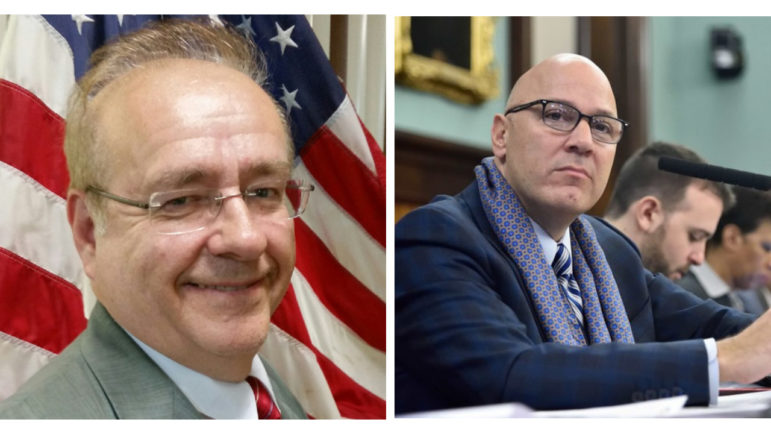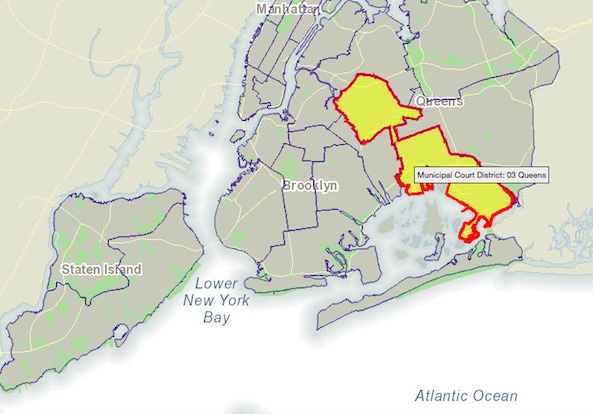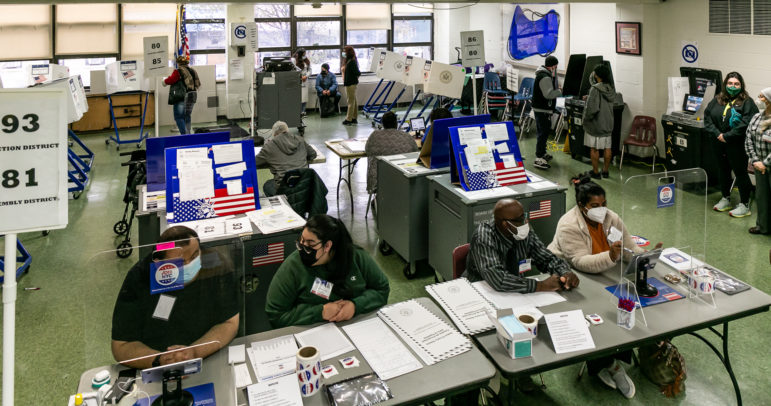After a tally of machine ballots, Joseph Kasper leads Paul Vallone, the scion of a Democratic political dynasty and a term-limited city councilmember, by more than 1,700 votes in the 3rd Municipal District, which covers a broad swath of south and central Queens.

Facebook/Joseph F Kasper for 3rd Municipal Civil Court Judge; John McCarten for NYC Council
Joseph Kasper, left, leads Paul Vallone, right, by more than 1,700 votes so far in the 3rd Municipal District.Republican attorney Joseph Kasper has run for the bench in Queens pretty much every year since 1995, but even he never thought he had a shot at actually winning.
For decades, Democrats, usually picked by the county party, won every judicial race in Queens, even as Republicans triumphed in several legislative contests. The two parties have frequently cross-endorsed candidates for the bench, but the Queens GOP says a Republican hasn’t won a head-to-head judicial contest since 1963, when former Assemblymember Angelo Graci earned a term in Supreme Court following his Civil Court appointment a few years earlier.
As Election Day approached last week, Kasper once again saw himself as a protest candidate.
“I’ve run many years because I believe very firmly in the two-party system and I think that should extend to the judiciary,” he said. “I was expecting that the Democratic majority of voters in the district would just overwhelm the Republicans.”
That’s not what happened.
After a tally of machine ballots, Kasper leads Paul Vallone, the scion of a Democratic political dynasty and a term-limited city councilmember, by more than 1,700 votes in the 3rd Municipal District. The district covers a broad swath of south and central Queens, including conservative strongholds like Howard Beach and Middle Village, but registered Democrats still outnumber Republicans there.
The race isn’t over yet. The Board of Elections sent out more than 5,300 absentee ballots in the district and Vallone says he’s “confident” most of them will break Democrat—just as absentees reversed Election Day leads for Republicans in the 2020 election. But it’ll be close.
So how did Queens get to the verge of electing its first Republican judge in nearly 60 years? That depends on who you ask.
A political ‘Rorschach test’
Across New York City, and nationwide, a few narratives have emerged to explain a tough Election Day for Democrats.
In the 3rd Municipal District, moderates blame progressives, like the Democratic candidate for the overlapping 32nd Council District, for fueling a conservative backlash and alienating voters concerned about public safety. Progressives pin the loss on a moribund mainstream Democratic Party, special interests that poured tens of thousands of dollars into area races on behalf of Republicans and a lack of support from influential local leaders like State Sen. Joseph Addabbo Jr. and Assemblymber Stacey Pheffer-Amato.
As the two factions feud, giddy conservatives say the result illustrates disillusionment with a Democratic Party they have portrayed as beholden to “progressive socialism,” in the words of District 32 Councilmember-elect Joann Ariola, who defeated her Democratic rival, Felicia Singh.
But the election post-mortem is “a Rorshach test just reinforcing your previously held beliefs,” said progressive political strategist Trip Yang.
Yang has sought to counter the narrative that Democrats suffered losses and shed moderate voters in Queens, Long Island, New Jersey and Virginia because of progressive messaging or specific candidates—in this case, school teacher Singh, the Democratic nominee who sought to become the first person of Indo-Caribbean or South Asian descent to represent the district.
The Council district, which overlaps with the 3rd Municipal District, has always been represented by white male Republicans and moderate Democrats. The notion that a progressive candidate hurt the Democratic Party is a microcosm of a nationwide debate over the political consequences of new bail laws, police reform activism and the “defund” movement during an uptick in crime. In the days since the elections, centrist Democratic leaders have circled the wagons and liberal editorial boards have called on the party to focus on winning over moderates.
But Yang said Singh worked to reach new voters, including many immigrant and first-generation New Yorkers who had never seen their communities represented.
“It is a complete bad faith type of argument,” Yang said. “The Democratic struggles were largely because of President Biden’s underwater approval ratings.”
He said blaming Singh and progressives was a “red herring” obscuring Democrats’ failure to activate their base or achieve much at a national level, as moderates stalled a massive infrastructure bill. He pointed to the likely victory of far-right Republican Vickie Paladino over moderate Democrat Tony Avella, who famously caucused with Republicans in the state Senate.
Queens’ former top judge disagrees. Jeremy Weinstein, a retired Queens Supreme Court administrative judge and state senator long active in the county Democratic party, pinned the potential loss of a judgeship squarely on the left.
“There was a tremendous backlash to progressive candidates,” Weinstein said. “Progressives need to see they’re not the future of the party. They’re the future of the end of the party.”
Weinstein said he knew many Democrats who backed Republicans in protest of what they see as the leftward drift of the party. “Ariola may have gotten half her votes from Democrats,” he added.
That’s probably overstating things—the actual number of Democrats who switched sides Tuesday will be hard to determine, though initial election results in Council District 32 do show a roughly 600-vote swing in favor of Republicans compared to the last contest in 2017.
That year, incumbent Republican Councilmember Eric Ulrich received 15,430 votes compared to moderate Democrat Mike Scala’s 8,037—even with Democrats galvanized by President Donald Trump in the White House. Four years later, Ariola widened the GOP margin of victory, receiving 16,040 votes to Singh’s 7,443, according to the BOE’s unofficial machine vote tally.
Meanwhile, Democrats elsewhere in the 3rd Municipal District may have had less incentive to cast a ballot than in previous years. Incumbent Councilmember Robert Holden won the Democratic primary and went on to secure the Republican line as well. Holden ended up receiving about 3,000 more Republican votes, the BOE results show.
The race at the top of the ticket—Eric Adams vs. Curtis Sliwa for mayor—also appeared to be a foregone conclusion (it was) providing less motivation for voter turnout.
The election could mark the third time in three years that a judicial candidate endorsed by the Queens County Democratic Party loses, after opponents beat county-backed candidates in Democratic primaries in 2019 and earlier this year. The party did not provide a response for this story.
Another possibility? Maybe the Republican Party was just too lackadaisical in other elections, ceding a winnable seat to Democrats. In 2017, for example, the party didn’t even run a candidate for the 3rd Municipal District. Democrat Tracy Catapano-Fox, now a state supreme court justice, ran unopposed and won a seat in civil court. In 2013, the Democrats and the GOP cross-endorsed candidate Anne Culley.

NYCityMap/DoITT
Queens Municipal Court District 3 covers a broad swath of south and central Queens, including conservative strongholds like Howard Beach and Middle Village, but registered Democrats still outnumber Republicans there.Voting in an overlapping Council district
There is no doubt that at least some registered Democrats in the 3rd Municipal Court District voted Republican this time around, however. But party-flipping voters who talked to City Limits said their choice was specific to Council District 32, and based more on Ariola’s involvement in the community rather than a protest against the Democratic Party.
Woodhaven resident Carmela Isabella, a former staffer for ex-Assemblymember Mike Miller, said she first met Ariola several years ago while the GOP chairperson was working for Jamaica Hospital and helped her out with a billing issue. Isabella said she had never voted for a Republican before, but remembered that assistance when she learned Ariola was running for Council. Isabella said Ariola’s perspective on “quality of life, safety and education” appealed to her, as did her work in the district.
“She said, ‘I’m a Republican’ and I said, ‘I’m a Democrat,’ and we said, ‘OK, let’s get together and talk about some issues.’ And when we talked about the issues, I felt like I connected with her,” Isabella said. “What we care about is what the person does in the community.”
Isabella said she split her ticket, choosing Democrat Vallone for judge and Adams for mayor.
Outside P.S. 640 in Ozone Park on Election Day, Sam Abdin, a Democrat, canvassed for Ariola and said he too was motivated by her long history in the district. “This isn’t national politics, it’s community politics and she does a lot for the community,” he said.
Other voters at P.S. 640 said they were eager to cast their ballots for Singh, listing public safety and the need for more South Asian representation as their top issues. Ozone Park resident Jon Leon, for example, said he has noticed an increase in crime based on notifications on the Citizen app, where everyday residents can post incidents.
“It’s become increasingly alarming,” he said. “I never used to see it this bad.”
Leon acknowledged that the app fuels a perception of rising crime by sending notifications of violent incidents and quality of life issues directly to his pocket, but NYPD crime data also does bear out an uptick in the area. “It’s probably a combination of both,” he said.
There have been five murders in the 102nd Precinct so far this year—the same as at this point last year—and five in the 106th Precinct, up from two at this point last year, according to NYPD reports. Shootings have each increased in both precincts, which overlap with Council District 32. Other major crimes, like robbery, burglary and grand larceny, have decreased.
Still, Leon said he was not swayed by messaging that blamed crime on progressive Democrats. “I was getting constant calls and constant mailers from Singh,” he said. “She did a good job campaigning.”
Another voter, Darien Picart, also said he was concerned with public safety and voted for Singh, who is of Guyanese and Punjabi descent. “I feel like she can change things,” Picart said. “We need new faces.”
For her part, Singh said she strove to expand the electorate, particularly among the district’s large South Asian community.
“I ran to include people who had never been part of our electoral process at all,” she said in a concession statement. “Folks who felt erased and neglected year after year after year.”

Adi Talwar
A scene from Election Day last week.Meet the (likely) new judge
The election analysis will continue for months to come, but one thing is clear: 26 years after his first bid for the bench, Kasper is on the verge of victory.
He says he’s confident his lead will hold and that he will take the bench come Jan. 1, 2022. A general practitioner, he has defended people on trial for murder in Queens Criminal Supreme and said he has “practiced in every portion of the Civil Court,” with much of his work taking place in Family Court.
He attributed his win to a combination of factors, including a motivated Republican base and Ariola’s “considerable coattails.”
“She pulled out a lot of voters in the district,” he said. “I think that the mayoral race had a relatively low turnout, Republicans in the district came out in greater numbers and I had the support of Councilman Robert Holden, who is very popular in the northern portion of the district.”
He also credited his “old fashioned, door-to-door” campaign.
“My son put together a lot of his friends,” he said. “We had a lot of eager young people.”
It was one of those young people who first told him he was winning during an Election Night party at Russo’s on the Bay.
“I walked in with my son and one of the young Republicans said, ‘Hey, you’re leading,’” he said, before paraphrasing a famous quote from long-shot 1965 mayoral candidate William F. Buckley. “I said, ‘I think I’m going to have to demand a recount.’”
He downplayed the narrative about a backlash against the progressive left and said he misses the days when President Ronald Reagan and Democrat Tip O’Neill could “have cocktails on a Friday evening.” But Kasper also said he voted for Trump, a leader who thrives on the division and resentment he said he hopes to eschew.
When asked whether he thought Trump lost the 2020 election fair and square, Kasper sounded a lot like an attorney.
“Judicial candidates are not supposed to express opinions and I respectfully decline to do so but I am permitted to speak history and I respectfully note the comments of Attorney General William Barr which was that there were not enough irregularities that could be proven that would have changed the result and I say that speaking as a former St. John’s government and politics student and not as a judicial candidate,” he said.
“I think the American people spoke in that election.”









